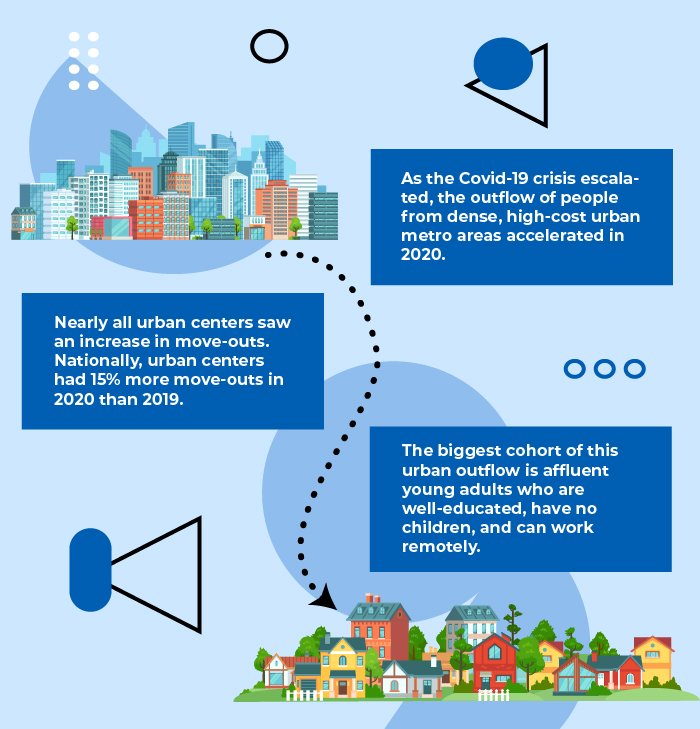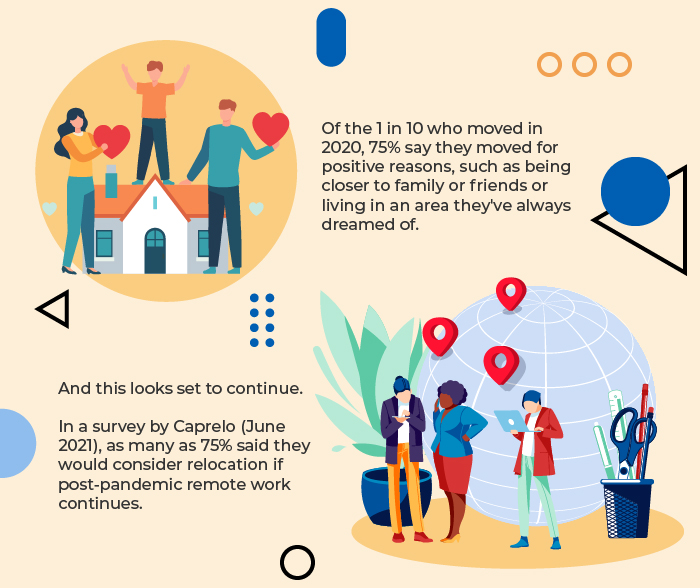- Rethinking that $3000-a-month studio? You’re not alone.
- After more than a year of physical distancing and lockdowns, many people are rethinking how and where they want to live.
- Some cities have experienced a mini exodus as people seek to maximize flexible work opportunities and readdress their work-life balance.
If you had the choice, why would you work remotely?
a. For convenience
b. To stop commuting
c. To escape office politics
You might answer ‘all of the above’.
Or, how about this:
d. Location independence.
Ever since the pandemic forced millions of people to work remotely, it has created a shift in mindset: “Why work from here when I can work from there?”
It has led some workers to make big moves.
According to Zillow (March 2021), more than one 1 in 10 Americans have moved in the past year.
Of course, the concept of remote workers moving is nothing new.
For digital nomads and established virtual workers, it’s part of life.
But this is different.
This trend relates to office-based workers who previously lived in cities that enabled a reasonable commute to a place of work.
Now, those same people are taking advantage of remote work policies. They’re taking the unprecedented opportunity that the pandemic has handed them and are uprooting their city lives in favor of location independence.
In this article, we dig deeper into the reasons why people are relocating, where they’re going, and how this is readdressing the work/life relationship.
Employees are Leaving Big Cities

Earlier this year, CBRE carried out an analysis of migration patterns using U.S. Postal Service data (April 2021). It revealed some interesting results:

San Francisco saw the biggest exodus. CBRE’s analysis found that the city’s metro area lost 1% of its population during 2020.
This prompts the question, why are workers leaving big cities?
To understand that, we need to understand what attracts workers to big cities in the first place.
Cities and urban areas are where people come together to work, live and play.
In 2018, research by the United Nations found that 55% of the world’s population were living in urban areas, a proportion that was expected to increase to 68% by 2050.
According to the World Economic Forum, people prioritize a city in which to live and work based on human factors. The most important is life satisfaction, followed by safety and security, pay and bonuses, and proximity to family and friends.
Here are some of the main reasons people live in cities:
- More job opportunities: Relocating to work in cities typically provides more job and more career opportunities, usually with a higher salary to match the cost of living.
- Business support: For businesses, cities represent an abundance of amenities such as workplaces, opportunities to network, easy access to specific advice, more routes to credit or funding, and so on.
- Infrastructure: An established infrastructure means reliable transport, education, healthcare, and diverse support networks, all within easy reach.
- Meeting people: City life is full of people and offers endless opportunities to meet new people and gain new business connections.
- Leisure amenities: Cities can cater to a vast array of hobbies, interests, sports, lifestyle regimes, cultural tastes, and more.
Remote Workers Moving and Leaving Cities
Now let’s reconsider our original question: why are workers leaving big cities?
In 2020, under threat of a deadly virus and the urgent need to keep physically distant from one another, densely populated cities became uncomfortable to live and work in.
Workforces stopped convening in a central location and rapidly dispersed.
Once loved for their hustle and bustle, cities became a place of confinement; for people with limited living areas and little outdoor space, the experience was stifling.
Physical distancing and lockdowns dragged on for more than a year, which upended the meaning of home and prompted many people to rethink how and where they wanted to live.
At the same time, many people were working remotely from home and discovering it was entirely possible — and even easy — to do their jobs remotely.
This prompted many to consider changing their lifestyle, as well as their home address.
Some took an impulsive approach and moved quickly, with a “fingers crossed” mentality that their employer would continue to allow remote work after the pandemic.
Others held out for more certainty.
Zillow’s survey found that financial uncertainty was a top reason why most people haven’t yet moved.
Another reason is the virus itself. 70% said they would be mostly or completely comfortable moving to a new home when vaccine distribution became widespread.
Why are Remote Workers Moving?

Where are virtual workers moving?
Caprelo’s findings suggest that only 40.7% want to stay within three hours of their current home.
The rest would prefer to move more than three hours away (28%), move within the same geographic region (16%), or move somewhere else in the world entirely (14.6%).
Of course this brings up numerous questions.
For instance, what state do you pay taxes in if you work remotely? The answer depends on the states in which you and your employer are located (if there’s any doubt, an HR or accounting professional can help).
Remote Workers Paid to Move
Did you know that some locations are paying remote workers to relocate?
In fact, there’s even a directory called MakeMyMove that lists the U.S. cities that will pay remote workers to move there.
Would you get paid to move and work remotely?
With some places paying up to $10,000 to help workers resettle as part of a remote worker relocation program, why not?
If you’re thinking, ‘Where can I move to work remotely?’ — the answer is really quite straightforward. It’s anywhere with the resources you need to complete your duties efficiently. If that requires a stable WiFi connection, a quiet place to work and occasional access to meeting space, the world really is your oyster.
As for the reasons behind remote workers moving, it seems money isn’t the only objective. Lifestyle is the big priority:
- 64% say affordable cost of living is the primary reason they want to move
- 51% said they want to be in a better climate
- 47% want to be closer to family
- 38% said they want to be somewhere with better access to hobbies and interests.
Not only that, workers recognize that their current home simply isn’t capable of doubling up as an office.
This is why many employees are now rethinking their home environments. This thought process may include:
- The need to upgrade limited home space in order to accommodate a suitable work environment along with lifestyle/family needs.
- A long-term desire to move out of the city and somewhere more desirable or closer to family, that is finally made possible owing to new remote work policies.
- Ability to work remotely means workers no longer need to live within commuting distance of a specific place.
- Cities represent busy areas and crowded commutes, which is still undesirable after more than a year of living with an easily transmittable virus.
- Cost is a big factor, as city living is expensive but moving to a smaller city or suburb can be more affordable.
- This affordability means workers can afford larger houses with room for home offices and additional living space, which helps work/life separation.
- For those who had to endure many months cooped up in an apartment with no outdoor space, the opportunity to buy a more affordable house with outdoor space is much more appealing.
Many companies have now made their stance on remote work clear. For those companies that are keeping to their remote-first promises, employees now face a new and very different future working from home.
Can you work remotely from anywhere?
If your work permits it, and if your employer agrees, why not? The key requirement is to ensure you have access to all the necessary resources to complete your work. If you can’t maintain productivity, your employer may rescind the offer. Therefore it’s in your interest to identify a suitable workplace as quickly as possible. A flexible workspace may help — look for coworking spaces in the area you wish to relocate to.
Around 89% of people expect to be able to work remotely at least some of the time after the crisis ends.
(And approximately 1 in 4 people are considering quitting their jobs if they don’t get the flexibility they want, which means companies are working hard to compromise.)
On the business side, remote work offers numerous benefits besides keeping employees happy and retaining talent.
The obvious benefit is cost, as companies can save money by reducing or eliminating office space.
Freed from geographic restrictions, it also means companies can hire from a much wider talent pool, rather than only selecting candidates within commuting distance of a centralised office.
Flexible and Virtual Offices Support the Business Transition

Most companies, even those with a fully remote or ‘remote first’ strategy still require some sort of hub or central point.
This may be to accommodate staff who still need to work onsite, and to provide a place for meetings, team collaboration and cultural cohesion.
One way businesses are adjusting to the changing landscape is to utilise flexible office space.
This allows companies to take out short-term rentals of virtually any size office and keep a flexible, low-risk outlook during this rapidly evolving period.
What’s more, flexible offices are popping up in multiple locations — including suburban areas — in line with demand.
- Flexible office space enables an easier transition while companies navigate the future, which may include resizing or right-sizing their central office space.
- Companies can maintain a presence in a specific city and remain visible to clients and investors. A virtual office can help with this, too.
- Flexible spaces ensure people have access to an office if needed, whether for client meetings or team collaboration.
- Employees working remotely may prefer to work near home, rather than at home. A coworking space can provide a suitable workplace to fulfil this need.
- Flexible spaces can also become part of a hub-and-spoke model, in which companies utilise small satellite offices in addition to a centralised office.
There is a wider benefit for using flexible spaces.
Some reports suggest this could re-invigorate the high street, by occupying vacant retail units in smaller towns and cities that have struggled during the pandemic.
“Creating a space where local people can come to work, as well as access shops or other amenities could be very attractive in both the short term, as people avoid public transport and commuting to city centres, but also in the longer term, as we move to a more flexible and local working culture.” — Workthere
Conclusion
Work and life have always been intertwined. Relocating to work in a specific location was a common reason to move, but now the tables have turned.
The relationship is changing and lifestyle is taking priority. Now, people are moving to work remotely.
Many workers are discovering that the location of their home is no longer dependent on the location of their job. Workers don’t need to stay in big, expensive cities anymore.
This opens up new and exciting opportunities to live a potentially healthier and more fulfilled life. It’s no surprise that thousands of people are choosing to seize that opportunity.
Virtual and flexible offices are supporting this change by providing cost-effective workplaces and people-focused communities, to help maintain productivity throughout this unprecedented period in our lives.
As for the future? Interestingly, CBRE claims that the outflow from urban areas may subside as normal life resumes and lower rents lure back some who had moved out.
However, what we do know is that choice and flexibility have taken centre stage, and those who have become accustomed to flexible work aren’t prepared to give it up. Some have already voted with their feet, and more will do so, if employers rescind this new-found location independence.
All the signs suggest that flexible and remote work is here to stay, leading more and more people to consider relocating in order to embrace positive change and rebalance their relationship between work and life.
Have you changed your lifestyle during the pandemic? Are you considering moving to work remotely — or have you done so already? Share your journey with us on Facebook, Twitter or LinkedIn.
Further Reading
- Rural America Booms as Young Workers Leave Cities Behind
- How to Successfully Transition to Remote Work During COVID-19
- Workers Are Fleeing Big Cities for Smaller Ones – and Taking Their Jobs with Them
FAQ
1. How do you tell your employer you’re relocating?
It’s best to talk to your employer before making any big decisions. Be open and honest, and explain that you value flexible work and want to continue working remotely. You may want to highlight that the opportunity to relocate will help you to enjoy a more fulfilling lifestyle, which will strengthen motivation and job loyalty and in turn, improve your productivity.
2. Will employers pay you to relocate?
Some locations and cities offer remote work relocation programs that are designed to attract remote workers to improve the local economy and generate inward investment. Whether an employer will pay you to relocate will depend on many factors, such as your skills, experience, years on the job, and of course, how flexible your employer is willing to be.
3. Why are people moving during the pandemic?
Some people moved during the pandemic because they recognised that working from home means they are no longer tied to a specific location. They took the opportunity to leave their previous home (whether due to cost, quality of life, limited space, or other reasons) and work remotely from a new location, which allows better work/life balance.
4. Who’s moving during the coronavirus?
More than 1 in 10 Americans (11%) moved during the pandemic, according to Zillow. New remote work policies have fueled this trend, with the majority of people (75%) saying they moved out of choice rather than necessity, and relocated in order to be closer to family or friends or to live in an area they’ve always dreamed of.
5. How many people are moving during the coronavirus?
According to Zillow (March 2021), more than one 1 in 10 Americans have moved in the past year. Among those recent movers, three quarters (75%) say they moved for positive reasons, such as being closer to family or friends or to live in an area they’ve always dreamed of.


















